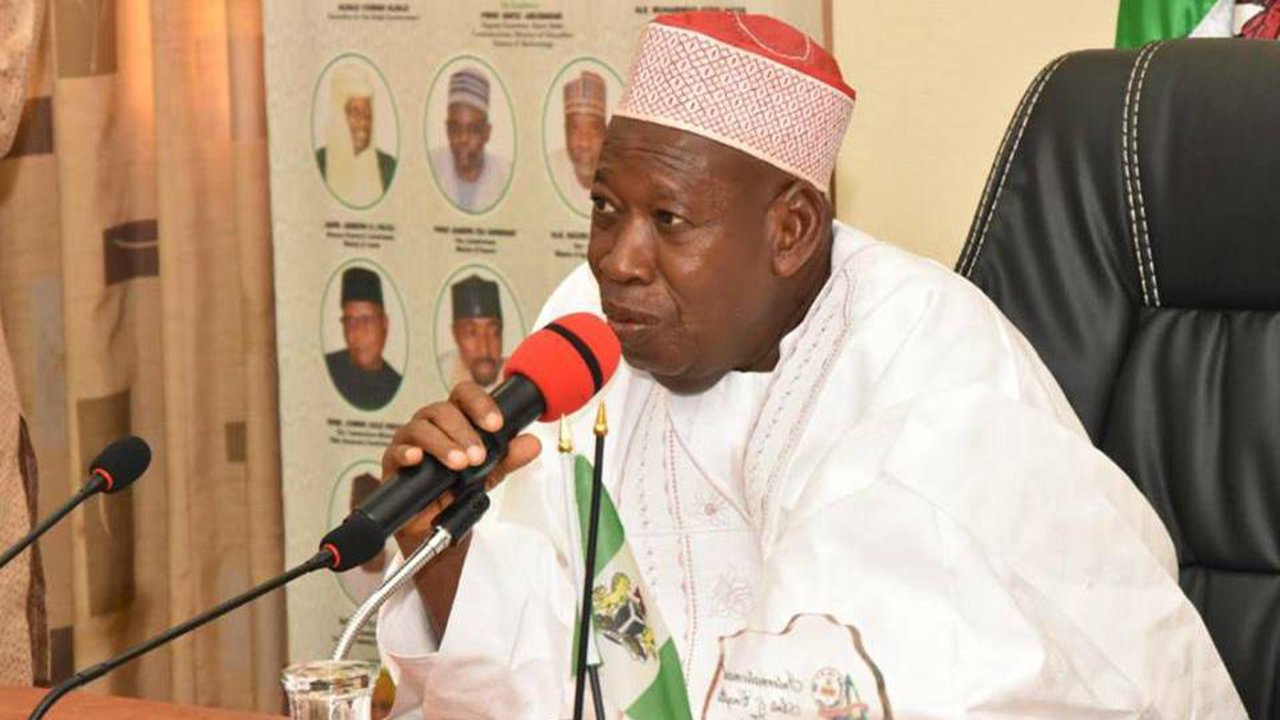Can someone save Kano civil service?
In just one swoop, the Kano State civil service known for its impartiality and professionalism has been set on the verge of destruction, and very soon the effect of Governor Abdullahi Umar Ganduje’s decision to ease out permanent secretaries apparently on political ground may begin to manifest, and the consequence will leave behind a divided […]

Kano Governor, Abdullahi Ganduje.
In just one swoop, the Kano State civil service known for its impartiality and professionalism has been set on the verge of destruction, and very soon the effect of Governor Abdullahi Umar Ganduje’s decision to ease out permanent secretaries apparently on political ground may begin to manifest, and the consequence will leave behind a divided system rather than a secure one.
By all standards, recruitment and promotion into the civil service are carried out on merit and in accordance with the established rules and regulations. Regrettably, a political dimension has been added to the process in Kano State, thereby reducing the system to an appendage of the governor’s office.
Historically, government changes periodically, but the civil service remains intact because of the security of tenure it enjoyed. That’s why the system is expected to be operated with some level of decorum, neutrality and discipline.
But Governor Ganduje’s decision to sack all the state’s permanent secretaries with administrative fiat, ahead of the commencement of his second term tenure, has set a bad precedence that might finally destroy the system.
A system that is known for its impartiality, neutrality and expertise has now been reduced to a mediocre status.
The governor’s action not only smacks of political vendetta but also his decision to re-nominate some, ask some to submit retirement notice while maintaining their status as permanent secretaries, and leave the rest to their fate, has a clear political undertone. Merit, which was expected to determine the choice to hire and fire permanent secretaries, was jettisoned, and sentiment instead took the centre stage.
The practice of fair hearing and display of justice was thrown overboard.
For the first time in the history of Kano State, civil servants were asked to apply to fill the vacant positions contrary to the established norm of making the appointment based on merit.
Those who were privileged to be re-nominated and those who were given the window to retire in their capacities as permanent secretaries are the favoured ones, while the future of the remaining ones, who were left in the cold, have apparently been destroyed after they built their career over the years as seasoned civil servants.
In the absence of due process as established by the law, it is clear to assume that Governor Ganduje was out to witch-hunt permanent secretaries perceived to be loyal to his predecessor, Rabiu Kwankwaso. His polarization of the state’s civil service is indeed his worst legacy-and very soon it will drive the civil service further apart and eventually bequeath a divided system which must be coaxed back together before it bedevil his successor.
Perhaps, most people in Kano are now beginning to see such an action as an intolerable betrayal that represents a dangerous gamble for the state. A flexible measure is indeed required to get the state out of the booby trap. The current action has been so vehemently opposed, but the possibility of addressing the issue fairly seems more remote under the present administration.
Permanent Secretaries who are supposed to organize, coordinate, and execute high-level administrative work, advise political appointees in formulation and implementation of policies and serve as communication link between them and other civil servants and supervise sensitive projects undertaken by the government are now reduced to appendage of governor’s office. And to say the least, this is a dangerous development for the state.
Unlike a director-general who is a political appointee, a permanent secretary is a person that builds his career and rises through the ranks, hoping to retire honorably after meritorious service to his people. But the permanency and security which he is supposed to enjoy have been destroyed over night, thereby exposing him to vulnerability. Hence, those coming to serve in the future might find it difficult to serve faithfully any government in power, no matter the controlling party.
As highly qualified and professionally experienced experts in their various fields, the formulation and implementation of government policies and programmes depend largely on them, since political office holders may not necessarily be specialists in the areas they supervise.
But in the absence of strict adherence to the established rules and regulations that guarantee their appointment and security and equally allow for checks against excesses, the Kano State administration’s approach not to allow evidence to speak for themselves against the perceived political involvement of permanent secretaries, but has also rendered them vulnerable.
In fact, it is the relevant expertise and experience of permanent secretaries rather than their perceived loyalty that affords them the opportunity of providing dependable guide and information on complex government policies and programmes. Hence, any attempt to politicize the process would be harmful not only to the system but also to the individual operators. That’s why in an attempt to show political vendetta, care must be taken not to sacrifice justice on the assumption of perceived loyalty.
Globally, the established practice is that the end of any government is the happiness of its people. But when a government chooses to view a class of permanent secretaries from a political prism as evidently done in Kano State, then their status would be anything but secure.
The danger in this kind of situation is that “an injustice to one is an injustice to all”.
Goronmaje writes from Unguwar Rimi, Kaduna
